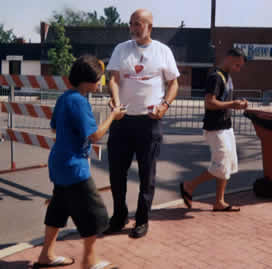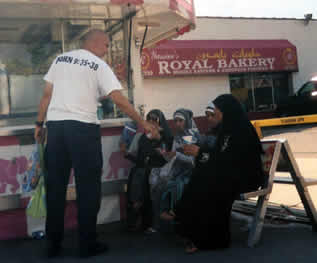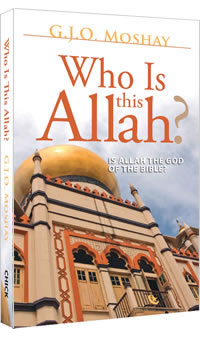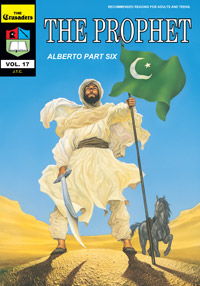I Love Muslims - I'd Take a Bullet For You
 Tim Berends lives in Las Vegas, Nevada, and has a goal of handing out 300 tracts a day on The Strip where 40 million people a year visit the casinos. His special burden is for Muslims. For the last two years, he has traveled to the annual Arab International Festival in Dearborn, Michigan.
Tim Berends lives in Las Vegas, Nevada, and has a goal of handing out 300 tracts a day on The Strip where 40 million people a year visit the casinos. His special burden is for Muslims. For the last two years, he has traveled to the annual Arab International Festival in Dearborn, Michigan.
This year, he and a friend were able to get over 1,600 copies of Is Allah Like You? into the hands of Muslims attending the festival. A section of downtown Dearborn was roped off and security was tightly controlled, making it very difficult to witness. Four Christians were arrested for disturbing the peace when Muslims mobbed them. Another one had to call the FBI to help him escape the area. Local police were of little help.
Berends used a different approach. He was wearing a T-shirt with "I (heart) Muslims" on the front and "John 9:35-38" on the back. When approaching someone he would smile warmly and say: As-Salamu Alaykum (pronounced, aah suh laah mu aah lay kum) which means "peace be upon you" in Arabic.
He was able to hand out tracts at about 30 concession stands before security stopped him. He moved to another area but soon the police arrived and told him he would have to go outside the perimeter if he wished to distribute literature.
Rather than fight for his rights of free speech on a public street, he complied and still was able to continue reaching hundreds of Muslims. The Christians who were arrested or rescued by the FBI were able to make a point about their Constitutional Rights, but failed in their mission to get much gospel into the hands of sinners. However, only a few people turned Berends down and less than a dozen tracts were thrown on the ground.
 By wearing the "I love Muslims" T-shirt and greeting them with "Peace be upon you" in Arabic, he usually was welcomed long enough to get a tract into their hands. "Most Christians have a fear of witnessing to Muslims," Berends says. "But they are just another kind of lost souls. When I see a group of young men coming toward me, I walk directly toward them with a smile, raise my voice and say 'As Salamu Alaykum.' Usually they will smile as they see my T-shirt and hear the greeting. I give each member in the group a tract and say: 'Here is one for each of you, so you won't fight over them.'" Using this good humor, he was rarely turned down.
By wearing the "I love Muslims" T-shirt and greeting them with "Peace be upon you" in Arabic, he usually was welcomed long enough to get a tract into their hands. "Most Christians have a fear of witnessing to Muslims," Berends says. "But they are just another kind of lost souls. When I see a group of young men coming toward me, I walk directly toward them with a smile, raise my voice and say 'As Salamu Alaykum.' Usually they will smile as they see my T-shirt and hear the greeting. I give each member in the group a tract and say: 'Here is one for each of you, so you won't fight over them.'" Using this good humor, he was rarely turned down.
Berends believes that this soft approach will get more of them to consider the gospel than with confrontation. He is ready to discuss with them should they wish, but always with the same attitude. If they ask about the tract before they read it, he will say something like: "It's our love letter to you." If they ask if he is a Muslim, he may reply, "No. But I love Muslims. I would be willing to take a bullet for you!"
Converted Muslim Mohammad Al Ghazoli, author of Christ, Muhammad and I, tells how, near the end of his frustrating life as a Muslim, he finally was given a Bible. When he thumbed it open, his eye fell on Matt. 11:28: "Come unto me, all ye that labour and are heavy laden, and I will give you rest."
Immediately he thought: "What kind of God is this?" Fascinated, he continued to read and finally surrendered to the God of the Bible. The unconditional love described in the Bible is a completely foreign concept to the average Muslim. Berends has found that approaching the Muslim with this attitude of unconditional love, any hostility will usually be defused long enough to get a gospel tract into their hands.
- See more articles on related topics:
- Islam
- Witnessing to Muslims
Products of interest:
-

When The Mosque Comes To Town
128 pages
What should a Christian do when the Mosque comes to town? Read a free excerpt here. -

Your Best Life
The most popular Chick tract, This Was Your Life, adapted for Muslims, not just in the Middle East, but also Europe and the Americas. -

Who Is This Allah?
256 pages
Islam is a religion without redemption, because it has a god who does not love mankind. Moshay PROVES that Allah and the God of the Bible are not the same. -

Prophet, The
32-PAGE, FULL COLOR COMIC BOOK - Alberto Series Part 7 - Learn how the papacy helped start Islam, only to have this new daughter rebel against her. You will understand the Arab’s place in Bible prophecy.
